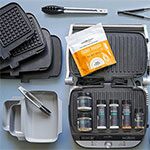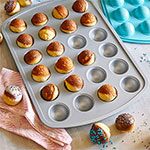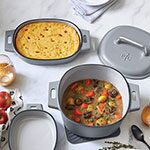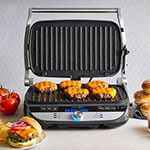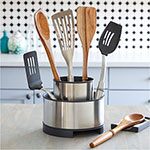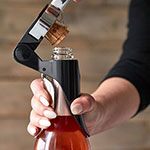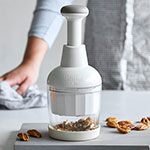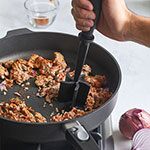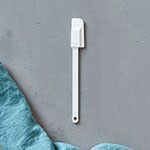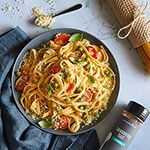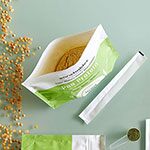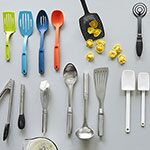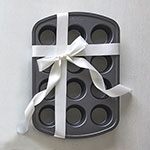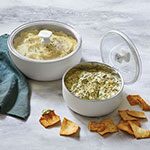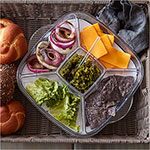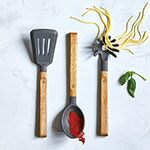10" Stainless Steel Nonstick Skillet
Get the Perfect Sear Every Time
This innovative pan combines the best features of stainless steel and nonstick cookware. The nonstick mesh coating provides the perfect sear (without the mess) and leaves fond for pan sauces and gravy. The size is perfect for one-pot meals.
Product Details
- 2¼-qt. capacity.
- Includes lid.
- The nonstick mesh grid lets you sear food and use fond to make pan sauces and gravy—and it's as easy to clean as nonstick cookware.
- Cleanup is easy because it's dishwasher-safe.
- Use your favorite utensils—even metal!
- Heat-safe to 450°F.
- Tempered-glass lid with stainless-steel rim is heat-safe to 450°F (230°C).
- Designed without rivets, so there’s no food buildup or rusting.
- Tri-ply clad—a heat-conducting aluminum core between an 18/10 stainless steel satin interior layer and a polished stainless 18/0 exterior layer for durability and faster, more even heating.
- Flared rims make pouring easy and keep stovetops and counters free of drips.
- Guaranteed for life.
Recommended:
-
Use & Care
Use & Care
CLEANING
Use & Care
- Wash before using for the first time; cookware and lid are dishwasher-safe. Dry completely before storing.
- Do not use abrasive cleansers like steel wool, cleansers with chlorine bleach, or oven cleaning solutions as they may permanently damage the pan and void the guarantee.
- To deep clean:
- For stainless-only portions of the pan (not the area with nonstick), use a stainless-steel cleanser to restore the luster and remove buildup and discoloration.
- For nonstick portion of the pan, use a nonabrasive sponge or cloth to deep clean. For tougher food buildup or occasional deep cleaning, prepare a baking soda paste by mixing ½ cup (125 mL) of baking soda with 3 tbsp (45 mL) of water. Apply to the desired areas and let it stand for 15–20 minutes. Wipe off excess paste, rinse thoroughly, and towel dry.
- To maintain a clean and shiny lid, periodically clean with a cloth dampened with vinegar or lemon juice. Rinse and dry completely.
- To remove water spots or discoloration, use a vinegar solution of equal parts water and vinegar. Apply vinegar solution with sponge or cloth. Allow to sit for 10 minutes. Rinse and dry completely.
USE AND CARE
- Storing: To help reduce scratches on interior and exterior coatings, place paper, soft cloth towels, or cookware protectors between pans when storing.
- Stovetop use: Cookware may be used on a glass or ceramic cooktop, electric coil, gas burner range, or induction range. Exterior surfaces of cookware and induction, glass top, and ceramic cooking surfaces should be clean and free of food residue before heating. Consult your stove manufacturer’s instructions for more details.
- Select a burner size that matches the diameter of the cookware base. For gas stoves, flames should not extend beyond base of cookware.
- Use appropriate heat level for cooking application. Overheating cookware can cause discoloration. Discoloration (blue-colored tint on exterior surface) will not affect the performance of the cookware.
- Low heat: Simmering liquids, warming food, and preparing delicate sauces
- Medium to medium-high heat: Preheating, sautéing, searing, frying, stir-frying, maintaining a boil
- High heat: Boiling and reducing liquids only
- For best results when sautéing or searing, preheat cookware before adding food. Do not preheat empty cookware: Before you begin cooking, add a small amount of cooking oil (Note: aerosol nonstick sprays are not recommended and may create a sticky residue which is difficult to clean if not washed promptly or overheated). Preheat for 1–2 minutes on medium to medium-high heat. Add food and adjust the heat setting as needed.
- Add salt to liquids once a boil is reached. Salt will not absorb into cold water and may leave small white marks on stainless surface. Salt should be added to foods toward the end of cooking.
- Oven use: Cookware is oven-safe to 500°F (260°C). Glass lid is oven-safe to 500°F (260°C).
- Broiler use: Never place this product under the broiler. The nonstick coating will be severely damaged and it will void the warranty.
- Microwave and outdoor grill: Not microwave- or outdoor grill-safe.
- Nonstick sprays and oils: Do not use nonstick sprays on the cookware as they cause an invisible buildup and impair the nonstick coating performance. Do not overheat oil, butter, or shortening. This will create a sticky residue that will affect the release of the nonstick and result in a reduced life of the coating.
- Utensils: Nylon, wooden, and plastic tools are recommended to maintain beauty of the stainless steel. Metal whisks and non-sharp metal utensils can be used, but may scratch the surface. In time, stainless will show wear from normal use.
- Sliding pans: Avoid sliding or dragging cookware over the surface of your stovetop, especially glass top ranges, as scratches may result and are not covered by the guarantee.
SAFEGUARDS
- Steam and splatter: Keep children away from the stove while cooking. Be careful around the stove as heat, steam, and splatter can cause burns.
- Unattended cooking: Never allow cookware to boil dry or leave an empty pan on a hot burner as the pan can get extremely hot. This could lead to warping or damage of the nonstick coating.
- Fumes: Do not overheat your nonstick pan as smoke or fumes from burning foods, oils, and the nonstick coating itself can be hazardous to the respiratory systems of pet birds.
- Gas flames: Gas flames should not extend up the sides of the pan. This will damage the exterior of the pan and handle, voiding the guarantee.
- Hot handles: Always use a heat-resistant oven mitt or pad when handling hot handles.
- Cooktop surface: For use on induction, flat glass, or ceramic cooktop surfaces, consult the manufacturer’s instruction manual before first use.
TROUBLESHOOTING
Problem Caused by How to Fix The nonstick coating has browned. - Overheating and/or using improper diameter size on gas or flattop stoves.
- Nonstick coating cannot be restored if browned.
The nonstick coating is peeling. - Overheating and/or using improper diameter size on gas or flattop stoves.
- Nonstick coating cannot be restored if it’s peeling.
There’s exposed metal (besides the pattern) under the nonstick. - Overheating and/or using improper diameter size on gas or flattop stove.
- Using a knife or sharp utensil on the surface.
- Nonstick coating cannot be restored if metal is exposed.
Sticking/nonstick coating does not release. - Using nonstick spray or overheating oil, butter, or shortening.
- Failure to properly clean after every use.
- Follow deep cleaning directions to remove residues.
GUARANTEE
- Lifetime guarantee for noncommercial use. Refer to sales receipt or website for details. The guarantee is limited and covers defects in materials and workmanship. The guarantee excludes damage by abuse or misuse (such as lack of or improper cleaning, overheating, use of caustic or other unapproved cleaners or use of nonstick sprays), ordinary wear and tear, or act of God. Product returned is subject to inspection for proper use and care.
Made in China
GuaranteeUse & Care
CLEANING- Wash before using for the first time; cookware and lid are dishwasher-safe. Dry completely before storing.
- Do not use abrasive cleansers like steel wool, cleansers with chlorine bleach, or oven cleaning solutions as they may permanently damage the pan and void the guarantee.
- To deep clean:
- For stainless-only portions of the pan (not the area with nonstick), use a stainless-steel cleanser to restore the luster and remove buildup and discoloration.
- For nonstick portion of the pan, use a nonabrasive sponge or cloth to deep clean. For tougher food buildup or occasional deep cleaning, prepare a baking soda paste by mixing ½ cup (125 mL) of baking soda with 3 tbsp (45 mL) of water. Apply to the desired areas and let it stand for 15–20 minutes. Wipe off excess paste, rinse thoroughly, and towel dry.
- To maintain a clean and shiny lid, periodically clean with a cloth dampened with vinegar or lemon juice. Rinse and dry completely.
- To remove water spots or discoloration, use a vinegar solution of equal parts water and vinegar. Apply vinegar solution with sponge or cloth. Allow to sit for 10 minutes. Rinse and dry completely.
USE AND CARE
- Storing: To help reduce scratches on interior and exterior coatings, place paper, soft cloth towels, or cookware protectors between pans when storing.
- Stovetop use: Cookware may be used on a glass or ceramic cooktop, electric coil, gas burner range, or induction range. Exterior surfaces of cookware and induction, glass top, and ceramic cooking surfaces should be clean and free of food residue before heating. Consult your stove manufacturer’s instructions for more details.
- Select a burner size that matches the diameter of the cookware base. For gas stoves, flames should not extend beyond base of cookware.
- Use appropriate heat level for cooking application. Overheating cookware can cause discoloration. Discoloration (blue-colored tint on exterior surface) will not affect the performance of the cookware.
- Low heat: Simmering liquids, warming food, and preparing delicate sauces
- Medium to medium-high heat: Preheating, sautéing, searing, frying, stir-frying, maintaining a boil
- High heat: Boiling and reducing liquids only
- For best results when sautéing or searing, preheat cookware before adding food. Do not preheat empty cookware: Before you begin cooking, add a small amount of cooking oil (Note: aerosol nonstick sprays are not recommended and may create a sticky residue which is difficult to clean if not washed promptly or overheated). Preheat for 1–2 minutes on medium to medium-high heat. Add food and adjust the heat setting as needed.
- Add salt to liquids once a boil is reached. Salt will not absorb into cold water and may leave small white marks on stainless surface. Salt should be added to foods toward the end of cooking.
- Oven use: Cookware is oven-safe to 500°F (260°C). Glass lid is oven-safe to 500°F (260°C).
- Broiler use: Never place this product under the broiler. The nonstick coating will be severely damaged and it will void the warranty.
- Microwave and outdoor grill: Not microwave- or outdoor grill-safe.
- Nonstick sprays and oils: Do not use nonstick sprays on the cookware as they cause an invisible buildup and impair the nonstick coating performance. Do not overheat oil, butter, or shortening. This will create a sticky residue that will affect the release of the nonstick and result in a reduced life of the coating.
- Utensils: Nylon, wooden, and plastic tools are recommended to maintain beauty of the stainless steel. Metal whisks and non-sharp metal utensils can be used, but may scratch the surface. In time, stainless will show wear from normal use.
- Sliding pans: Avoid sliding or dragging cookware over the surface of your stovetop, especially glass top ranges, as scratches may result and are not covered by the guarantee.
SAFEGUARDS
- Steam and splatter: Keep children away from the stove while cooking. Be careful around the stove as heat, steam, and splatter can cause burns.
- Unattended cooking: Never allow cookware to boil dry or leave an empty pan on a hot burner as the pan can get extremely hot. This could lead to warping or damage of the nonstick coating.
- Fumes: Do not overheat your nonstick pan as smoke or fumes from burning foods, oils, and the nonstick coating itself can be hazardous to the respiratory systems of pet birds.
- Gas flames: Gas flames should not extend up the sides of the pan. This will damage the exterior of the pan and handle, voiding the guarantee.
- Hot handles: Always use a heat-resistant oven mitt or pad when handling hot handles.
- Cooktop surface: For use on induction, flat glass, or ceramic cooktop surfaces, consult the manufacturer’s instruction manual before first use.
TROUBLESHOOTING
Problem Caused by How to Fix The nonstick coating has browned. - Overheating and/or using improper diameter size on gas or flattop stoves.
- Nonstick coating cannot be restored if browned.
The nonstick coating is peeling. - Overheating and/or using improper diameter size on gas or flattop stoves.
- Nonstick coating cannot be restored if it’s peeling.
There’s exposed metal (besides the pattern) under the nonstick. - Overheating and/or using improper diameter size on gas or flattop stove.
- Using a knife or sharp utensil on the surface.
- Nonstick coating cannot be restored if metal is exposed.
Sticking/nonstick coating does not release. - Using nonstick spray or overheating oil, butter, or shortening.
- Failure to properly clean after every use.
- Follow deep cleaning directions to remove residues.
GUARANTEE
- Lifetime guarantee for noncommercial use. Refer to sales receipt or website for details. The guarantee is limited and covers defects in materials and workmanship. The guarantee excludes damage by abuse or misuse (such as lack of or improper cleaning, overheating, use of caustic or other unapproved cleaners or use of nonstick sprays), ordinary wear and tear, or act of God. Product returned is subject to inspection for proper use and care.
Made in China
Guarantee
header goes here
content goes here.


 Canada (en)
Canada (en) Germany (de)
Germany (de) Austria (de)
Austria (de)